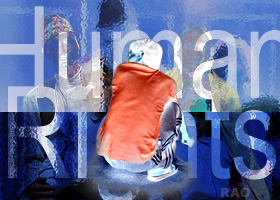
|
 |
| Nepal in Crisis 2006: Human Rights |
|
|
|
|
|
| High-level ICJ mission under way |
Kathmandu,
September 29, 2005, IRIN
From dawn to dusk, Shanta Bhandari spends her time looking for her son, who disappeared in 2002 when the Nepali police arrested him on charges of working with the Maoist rebels, who have been waging an armed rebellion against the state for the last 10 years.
 |
|
During the four-day visit, which began on Wednesday, the delegation will focus on the judiciary's role in defending human rights, as well as respect for the judiciary's decisions, in addition to restrictions on human rights defenders and lawyers.
ICJ Secretary-General Nicholas Howen, who is leading the delegation, has met with senior government officials, the National Human Rights Commission, the Chief Justice and members of the judiciary and lawyers. According to human rights activists, the visit plays a significant role in pressuring the state to respect the judiciary and allow it to work independently - especially at a time when rule of law is weakening.
"As an international watchdog, the ICJ can help to create an environment to internationally pressurise the state to respect the judiciary's decisions," Mandira Sharma, a lawyer for Advocacy Forum, a human rights organisation, said. Her group has been strongly advocating against torture and impunity of detainees arrested on charges of being Maoists - who have waged an armed campaign against the government for nine years.
According the human rights groups, the government has allowed security forces to arrest anyone on charges of being Maoists and activists are concerned that many innocent civilians have been falsely arrested and subjected to torture.
But the main concern among lawyers was that despite court decisions to release the detainees, many were rearrested by the police as soon as they were released, defying the orders of even the Supreme Court. In June, security forces rearrested Karna Bahadur Magar and Bablu Tamang on the court premises despite his release order.
Recently, Maoist student leader Krishna KC was ordered by the Supreme Court to be set free. KC had been detained for the last 25 months in an army barracks where he was severely tortured. The Supreme Court gave orders last week to release him. However, he was promptly rearrested as soon as he came out of the court.
Insec and other rights groups condemned that such actions by the administration were illegal and said that this only mocked the principles of the rule of law. Several rights organisations and lawyers' organisations have been protesting such contempt of court. The lawyers, however, want the Supreme Court to raise this issue of state defiance towards the court orders, at least for its own protection.
"It is in such cases that we need an international body like the ICJ. It can play a key role in making recommendations to the attorney-general, as per suggestions by activists and lawyers, not to allow state defiance of the court," explained human rights lawyer Bidya Chapagain from the local human rights group, Insec.
It is understood that the ICJ mission will be meeting the attorney-general soon and will make recommendations.
Lawyers are worried that such acts of defiance against the judiciary have already lost trust amongst the public, especially amongst the families of the victims who have come to the court for justice.
"Such defiance is a systematic way to weaken the judiciary system, which in turn can be a traumatic experience for the families for whom the justice system is their last hope," said Sharma, who added that security forces had been falsifying evidence and fabricating statements to rearrest the released individuals.
The ICJ will make its statements public during the end of the week and is expected to be critical as they have been on previous visits. In March, it said that Nepal was in the midst of a human rights crisis marked by enforced disappearances, extrajudicial execution, torture, secret detention and impunity of the security forces. It also criticised King Gyanendra for abandoning the rule of law and deepening the conflict after he assumed direct rule in 1 February.
Meanwhile, lawyers said that the ICJ will be working closely with NGOs on over 15 themes particularly related to human rights, torture and law. The ICJ also helped a group of 25 human rights organisations to establish a human rights home in the capital to provide shelter and protection to human rights defenders, who were especially at risk after a state of emergency was imposed after 1 February.
Copyright © UN Office for the Coordination of Humanitarian Affairs 2006
[ This report does not necessarily reflect the views of the United Nations]
Integrated Regional Information Networks (IRIN), part of the UN Office for the Coordination of Humanitarian Affairs (OCHA).
 |
 |
